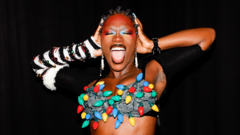In recent weeks, Katy Perry has faced significant online criticism, leading her to describe herself as a "human Piñata." This phrase captures the mix of humor and seriousness in her experience as she contends with regressions in her pop stardom. Once a dominating force in the music industry, known for catchy hits like "Teenage Dream" and "Roar," Perry's image and relevance have come under scrutiny, following her prominent roles in a Blue Origin spaceflight and a world tour sparking mockery.
Katy Perry's Bumpy Ride: From Bubblegum Pop to Internet Drama

Katy Perry's Bumpy Ride: From Bubblegum Pop to Internet Drama
American singer Katy Perry reflects on her tumultuous journey as a pop star amid online backlash and evolving music trends.
Casting a shadow over her attempts at musical reinvention, critics argue she seems out of touch with current pop culture and unable to connect with a new generation of fans. Michael Cragg, a music writer, emphasizes her struggle to keep pace with a fast-evolving music landscape, especially as other female artists rise with authenticity and confidence. Perry's latest singles fail to resonate, showcasing a creative disconnect amidst harsh online commentary.
Furthermore, the backlash against Perry reflects broader societal attitudes towards pop icons, particularly female artists, leading to questions about the role of misogyny and internet toxicity in shaping public perception. Amidst this turbulence, Perry's devoted fan community has shown their unwavering support, demonstrating that while her journey has been tumultuous, a segment of the audience still cherishes her vibrant legacy.
The path forward for Perry remains uncertain, but industry experts believe a successful single could help stabilize her public image.
As she contemplates her future, the blending of her iconic past and intentions for reinvention will be essential in defining her next chapter in the challenging world of pop music.
In conclusion, Perry's rollercoaster experience exemplifies the challenges many artists face in navigating the competitive music industry, where changing tastes and complex social dynamics collide.
Earlier this week, American singer Katy Perry, known for her catchy pop songs, described feeling like a "human Piñata" after enduring significant online backlash. This statement encapsulates the seriousness of her situation, as she faces mockery for her participation in a controversial Blue Origin spaceflight that has seemingly led to a decline in her star status. Following the spaceflight, her world tour, which launched in Mexico, has also been met with scathing critiques, with many suggesting an increasing disconnect between her pop persona and current cultural trends.
Music journalist Michael Cragg highlights Perry's perception as out of touch, particularly since she has not topped music charts in years. Past attempts at music reinvention, including her latest single "Woman’s World," have faltered in drawing acclaim, casting doubt on her lyrical depth. The shift within female pop stardom is underscored by rising artists embodying authenticity, contrasting with Perry's attempts to distance herself from her established pop character.
Social media plays a pivotal role in how celebrities like Perry are perceived, leading to a toxic environment where public figures are scrutinized, and personal lives are invaded. Perry's encounters with online criticism have raised questions around misogyny and the intense spotlight on ambitious female stars in the industry. Despite this, her loyal fanbase has rallied to support her amidst adversity, showcasing a continuing connection to her artistry.
Looking ahead, experts suggest that a hit single could reignite her career, although it might not restore her to previous commercial successes. Perry's story symbolizes the struggle of many artists trying to navigate a rapidly changing landscape that blends personal vulnerability with the demands of public expectation.
Furthermore, the backlash against Perry reflects broader societal attitudes towards pop icons, particularly female artists, leading to questions about the role of misogyny and internet toxicity in shaping public perception. Amidst this turbulence, Perry's devoted fan community has shown their unwavering support, demonstrating that while her journey has been tumultuous, a segment of the audience still cherishes her vibrant legacy.
The path forward for Perry remains uncertain, but industry experts believe a successful single could help stabilize her public image.
As she contemplates her future, the blending of her iconic past and intentions for reinvention will be essential in defining her next chapter in the challenging world of pop music.
In conclusion, Perry's rollercoaster experience exemplifies the challenges many artists face in navigating the competitive music industry, where changing tastes and complex social dynamics collide.
Earlier this week, American singer Katy Perry, known for her catchy pop songs, described feeling like a "human Piñata" after enduring significant online backlash. This statement encapsulates the seriousness of her situation, as she faces mockery for her participation in a controversial Blue Origin spaceflight that has seemingly led to a decline in her star status. Following the spaceflight, her world tour, which launched in Mexico, has also been met with scathing critiques, with many suggesting an increasing disconnect between her pop persona and current cultural trends.
Music journalist Michael Cragg highlights Perry's perception as out of touch, particularly since she has not topped music charts in years. Past attempts at music reinvention, including her latest single "Woman’s World," have faltered in drawing acclaim, casting doubt on her lyrical depth. The shift within female pop stardom is underscored by rising artists embodying authenticity, contrasting with Perry's attempts to distance herself from her established pop character.
Social media plays a pivotal role in how celebrities like Perry are perceived, leading to a toxic environment where public figures are scrutinized, and personal lives are invaded. Perry's encounters with online criticism have raised questions around misogyny and the intense spotlight on ambitious female stars in the industry. Despite this, her loyal fanbase has rallied to support her amidst adversity, showcasing a continuing connection to her artistry.
Looking ahead, experts suggest that a hit single could reignite her career, although it might not restore her to previous commercial successes. Perry's story symbolizes the struggle of many artists trying to navigate a rapidly changing landscape that blends personal vulnerability with the demands of public expectation.




















